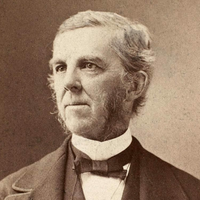Chanson Without Music
BY THE PROFESSOR EMERITUS OF DEAD AND LIVE LANGUAGES
PHI BETA KAPPA.—CAMBRIDGE, 1867
You bid me sing,—can I forget
The classic ode of days gone by,—
How belle Fifine and jeune Lisette
Exclaimed, 'Anacreon, geron ei’?
‘Regardez done,’ those ladies said,—
'You’re getting bald and wrinkled too
When summer’s roses all are shed,
Love ‘s nullum ite, voyez-vous!’
In vain ce brave Anacreon’s cry,
'Of Love alone my banjo sings’
(Erota mounon). 'Etiam si,—
Eh b’en?' replied the saucy things,—
'Go find a maid whose hair is gray,
And strike your lyre,—we sha’n’t complain;
But parce nobis, s’il vous plait,—
Voila Adolphe! Voila Eugene!'
Ah, jeune Lisette! Ah, belle Fifine!
Anacreon’s lesson all must learn;
O kairos oxiis; Spring is green,
But Acer Hyems waits his turn
I hear you whispering from the dust,
'Tiens, mon cher, c’est toujours so,—
The brightest blade grows dim with rust,
The fairest meadow white with snow!'
You do not mean it! _Not_ encore?
Another string of playday rhymes?
You ‘ve heard me—nonne est?-before,
Multoties,-more than twenty times;
Non possum,—vraiment,—pas du tout,
I cannot! I am loath to shirk;
But who will listen if I do,
My memory makes such shocking work?
Ginosko. Scio. Yes, I ’m told
Some ancients like my rusty lay,
As Grandpa Noah loved the old
Red-sandstone march of Jubal’s day.
I used to carol like the birds,
But time my wits has quite unfixed,
Et quoad verba,—for my words,—
Ciel! Eheu! Whe-ew!—how they’re mixed!
Mehercle! Zeu! Diable! how
My thoughts were dressed when I was young,
But tempus fugit! see them now
Half clad in rags of every tongue!
O philoi, fratres, chers amis
I dare not court the youthful Muse,
For fear her sharp response should be,
‘Papa Anacreon, please excuse!’
Adieu! I ‘ve trod my annual track
How long!—let others count the miles,—
And peddled out my rhyming pack
To friends who always paid in smiles.
So, laissez-moi! some youthful wit
No doubt has wares he wants to show;
And I am asking, ’Let me sit,'
Dum ille clamat, ‘Dos pou sto!’

